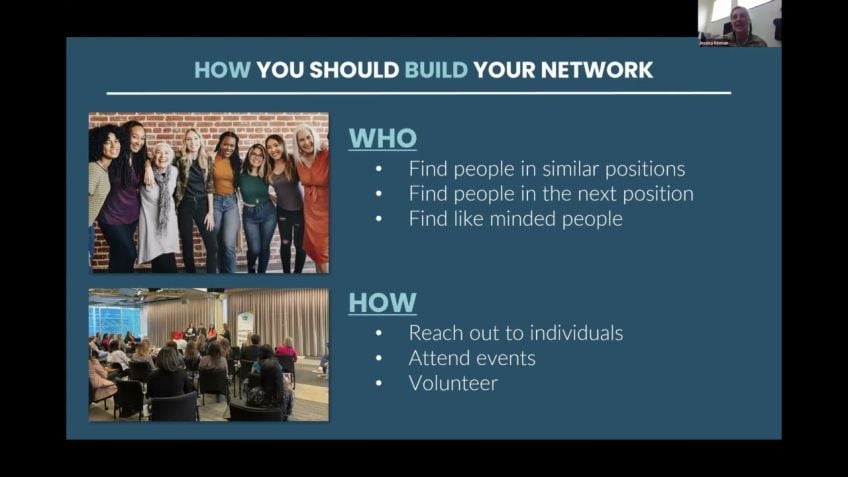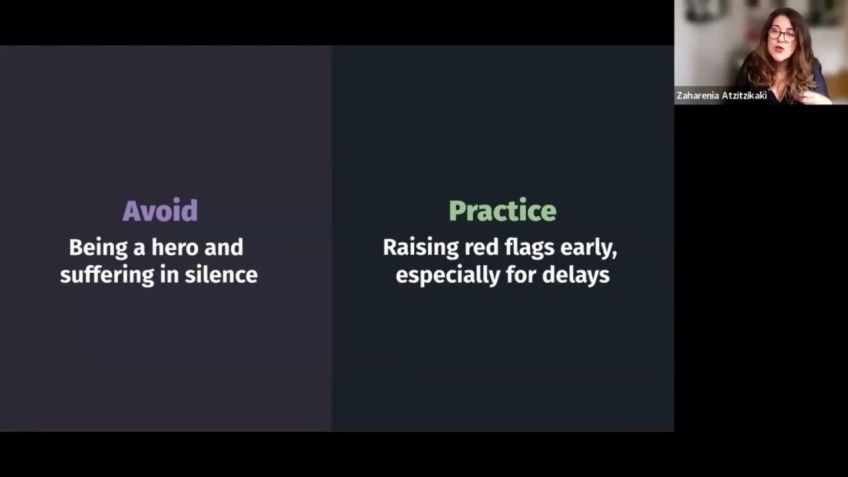Positive management, the bright side of leaders
Susana Duran
Enterprise Support ManagerA Guide to Positive Management: The Bright Side of Leaders
Welcome, everyone, to this insightful session on positive management and the vibrant side of leadership. I'm an enterprise support manager for Strategic Accounts at AWS with a technical background, and a seasoned speaker at various women in tech conferences. The intent today is to realize the roots of positivity and how it impacts leadership, especially in a tech-space.
Delving into Emotions
How are you today? How do you feel? These basic questions may seem to hold little relevance at first but understanding your emotions is the pre-eminent step towards self-awareness. Acknowledging your feelings, recognizing their intensity, and managing them is the cornerstone of positive leadership. Let's dive a little deeper into the realm of self-awareness and emotional balance at the workplace, and their collective significance.
The Power of Self-Awareness and Emotional Intelligence
Self-awareness is the ability to recognize and understand your thoughts, emotions, and feelings. This internal understanding is crucial as it indirectly influences our actions, choices, and perceptions. The leader, who can manage their emotions effectively, can create a positive impact on the team’s productivity.
Emotional intelligence (EI or EQ), on the other hand, is the knack to develop productive relationships with others. It's about balancing your intellectual quotient (IQ) with your EQ. A study by Fortune 500 CEOs revealed that a staggering 75% of long-term job success depends on people skills (EQ) while only 25% relies on technical knowledge (IQ).
High-Performance Managers and Their Attributes
Good managers make their mark not just by their technical competence but their emotional intelligence. High-performance managers – the ones with high EQ – build great teams that invariably showcase high performance. Research corroborates that happy teams are the high performing teams. When examined closely, all attributes of esteemed managers root back to positivity.
- Show gratitude genuinely and consistently in both public and private.
- Recognize and compliment team members' efforts and achievements.
- Give credit where it’s due, whether the deserving team member is present in the room or not.
- Mark special occasions such as work anniversaries, etc.
They efficiently create a positive environment and attach a higher purpose to the team's work. Such managers are transparent, ethical, and earn the trust of their team.
The Magic of Positive Influence
A positive influence not only nurtures a livelier work environment but also mirrors favorably on personal health, boosting immune response and reducing the risk of heart attacks. An optimistic person has a 50% greater chance of living beyond 85 years old than a pessimist.
Create a Positive Atmosphere during Meetings
Promoting positivity and showing gratitude during meetings can significantly uplift the team's spirit. Keep these simple steps in mind to ensure positivity during meetings:
- Share the agenda of the meeting in advance.
- Start the meeting with expressions of gratitude and appreciation.
- Encourage team to contribute to the agenda.
- Ensure the meetings are time-managed.
- Never finish a meeting with bad news. Always end on a positive note.
- Return meeting time back to the team, if possible.
In Conclusion
Remember to increase your self-awareness, empathize, recognize your strengths, develop positive skills, showcase gratitude, and spread positivity. By constantly practicing these, you will be able to lead a happier, high-functioning team. And remember, whenever in doubt, start with the simple question, "How are you today?"
Thank you for your time and for listening. If you have any questions or need further clarification, please feel free to reach out.
Stay positive, show gratitude, and impact your teams positively.
Thank you.
Video Transcription
Mm And here, here we are. So thanks everyone for joining this session, positive management, the bright side of leaders. And let's start with this. But first let me introduce myself and this is me. I'm currently enterprise support manager for Strategic Accounts at AWS. And Well, why I'm here?
Well, I'm I have a technical background. My journey started coding that I've been project manager, project manager, team area manager, working for start ups and for multinationals. And this is not my first time in speaking at women in tech conferences or events, increasing visibility of the amazing women we have escaped and supporting these conferences, communities and even through mentoring is my way to contribute. So, before talking about positivity, let me start with a simple question. How are you today? How do you feel? Yes, it's a basic question but please think about it. You can type on the chat. Um What is the emotion that describes your feelings today? And while you type it or you think about it, let me go first and I would say that I'm excited, but I'm also a bit scared. Well, not exactly like that. Um But it's not easy to identify your emotions and well, finding the right word for the right intensity. It's not easy either. Yeah, I see some of you say just, uh, some of your emotions. But yeah, it, it's not easy and you can see here just the list, a huge list of emotions. But to do it with accuracy, we need a high degree of self-awareness. And what's that?
Well, it's the ability just to recognize and understand your own thoughts, feelings, and your emotions and recognize them is the first step to control them. There are many different types of emotions that have an influence on how we live and interact with others with our teams.
At times, we might seem like we are ruled by these emotions, the choices we make, the actions we take, the perceptions we have are all infinite at these emotions, the ones that we are experienced at any given moment. So think aga again on the question, how are you today? And then think about the next question. How is your team today? Because self-awareness is critical for you to understand yourself and to be able to manage your emotions. But you also need to know how to read the room. And this is social awareness, the ability to recognize others, emotions and the dynamics in place within your teams or the organization. And if you can understand their emotions, then you can influence coach and mentor others and even resolve conflicts, effectively leaders that argued at social awareness, practice empathy, they strive to understand their colleagues feelings and perspective, which enables the team to communicate and collaborate more effectively with their peers.
Ok. But why are we talking about the motions at work? Well, usually companies are evaluating our intelligence, our hard skills, coding ability to plan et cetera. But well, let's see how we can measure this intelligence IQ intelligence quotient. It's in a specific number derived from a standardized intelligence test. And scoring between 9109 is average over 130. It's highly superior intelligence and less than 69 is well, extremely low. So scores are calculated by comparing the test takers to score to the results from other people in the same age group. But there is another kind of intelligence, yeah, emotional intelligence or IQ that is the ability to manage and develop productive relationships with others.
A research conducted by Fortune 500 CEO S found that 75% of long term job success depends on people skills. EQ while only 25% on technical knowledge IQ that this is all about having a good balance between both, believe it or not the ideal ratio of EQ to IQ in a workplace should be 8020. How can we measure EQ, there's no single test of a person EQ and the way, at least the way that it's for IQ. So that's something somehow tricky. And we know that um employees who have managers with high emotional intelligence are four times less likely to live than those who are managed by low emotional intelligence managers. So with all that demand, hey, maybe emotions matter of work and yes, emotions matter at work and a good control of them, it's also important for high performance managers. Now, we could talk about all the common qualities of high performance measures, but the let's just bring some of them on the table and you can see that all of them are positive qualities.
Um No one expects an obscure and secret manager with a pessimistic view for everything, showing differences for the team. Maybe there is one or two of them, but they will not have a high performance. The and high performance managers have high chance to have high performing teams, are they? And many studies confirm that happy teams are likely to have high performing teams. So what can we do to have a happy, high performing team? And these are two areas that we know that contribute to the increase the happiness of our teams, gratitude, factful and positivity. Big optimistic. So let's start with the first one. Managers have to express gratitude first in a clear, consistent and genuine way, both in public and private.
Before you do it, please ask the team, how do you wish to be thanked? So it will help you to adapt your thank you wishes to each individual. And let's start with recognition and compliments the easier ones or not, Sheria, you did a great job taking ownership of that issue, managing all the stakeholders. That was amazing. Or maybe let's comrade Melissa for her second technical certification or we are proud to have you in the team or even if someone killed us online, it's up to you. But everyone likes recognition and not being recognized, it generates a negative environment. And there are great achievements that these have been shared with. Most senior senior leaders sometimes showing gratitude in petit committee. It's not enough and employees deserve more visibility, support them, give credit, maybe someone is not there. So we don't mention it.
It was part of a project or an idea. Let's do it. Let's give credit whether they are in the room or not. This will make you gratitude draw model for the team and will demonstrate transparency. And finally, there are special occasions that it's worth having in our agenda like work anniversaries and depending on the company, even birthday showing appreciation when someone in your team has their first or seventh work anniversary will show we care about those individuals.
The second part positivity, we need more. You will say why let me test you. This is from the IQ, the EQ team at the Amazon Extern mine. But I thought it was an amazing way to explain how we humans are, what impacts you the most. Let me know, I bet it's the last sentence, right? If you are like me and like the most part of you, it's those last few words, but run a bit long, even though there are four positive things. The negative one is the one that grabs our attention. The key is how to neutralize it. And the way we do it is by having healthy, healthy balance, we have enough negativity during the day, we have enough negative biases. We need to neutralize negativity in our workplace. And let's create a happier team with some hands. Then let's create a positive environment where the team is safe to speak up, share their work or even make mistakes. This also boost confidence and creativity and innovation. Let's attach meaning to their work beyond the act of just getting things done. When employees see their work as being connected to a higher purpose, they are more likely to be positively engaged. And now that we have purpose, let's define how to achieve it with smart goals. Let's define them and earn trust, earn trust with your team. Be transparent and ethical.
Although as a leader, you need to be careful walking the line between being honest and over sharing and finally smile more Justine how would you feel if you work with someone that looks at you like this? Smiling makes these employees feel at ease and creates a positive atmosphere where employees feel more confident in expressing their opinions. However, smiling too much can be the opposite effect. I have an opposite effect. Even smiling when delivering bad news, just common sense and think and share with your team that positivity also improve your and your team's immune response and lower the risk of heart attacks. Optimistic people have 50% greater chance of living beyond 85 years old and pessimist. Wow.
And where can we practice gratitude and positivity? Ok. It's meetings, maybe one on ones, maybe any other meeting that meetings are the place and there are a few basic things that you can follow to make them better. And here I'm going to share with you some hands. So let's start with always sharing the agenda. You need to show the purpose in advance and expect them to do exactly the same in their meetings. Start with gratitude. I said before that showing appreciation, not only just you ask them that to share some good stories with the rest of the team, make them part of the meeting point, the driver maybe and ensuring that someone has an eye on the clock. That's a good starting point and ask them just to be the the to me the meeting to stay on the topic and make sure that they are controlling what they are talking about if they cannot do it, ok? You can be there and keep it can be the guardrails, but ask them to do it. Also ask the team as a team to fill in part of the agenda or maybe all of them depending on the meeting with the topics they want to discuss. It could be team goals, it could be training even let them ask about rumors to avoid dangerous conclusions and finally never finish those meetings with bad news.
Don't let them go with that negative feeling that they have just heard something negative, that feeling that will last a whole week just end with a positive note and there's nothing better than give them time back between meetings. So with a final smile, just let them know that they have 5, 10 minutes back. Do they think so? Maybe after hearing all these topics, you will think that it was common sense but everything in this list is here because I, so let's review what we said. And first let's increase our self-awareness and recognize our emotions and control them. Then we need to empathize with the team and read their emotions to better support them as a manager list your strengths and work on those areas that are not positive skills. It has to do with the previous one. Are you empathetic and active listener transparent enough, a good role model for your team? If so, you will be recognized as a manager with high emotional intelligence and it will help your team to grow and to be happier managers with high EQ use their soft skills to develop their teams in a way that makes them happier. You can think on different methods, but you can try focusing on improving these two areas. Gratitude n practically positive in a visible way and positivity created a safer environment with purpose and earned distrust and finally practice, practice, practice in your meetings.
But you can also practice outside, work at home with your friends whenever you want, whatever you want. And maybe you can just start with a, how are you today? So that was all I wanted to share with you. Be positive, show gratitude and share this with your teams. And if you have any questions, just let me know. Thank you very much for your de just a copy of the deck. It will be this presentation. It will be available. So it will have just all the skins and everything available for you if you have. So let me just, yes, thank you very much. It was, it was a pleasure again. Um If you have any questions, you can just um ask me and these are the last minute of this presentation, I will stay here bad. If not, thank you again. Just looking at the timing. It's I will just tell you just to sing in your next meeting. Should I smile a bit more or just, I should try just to be a bit uh different, different face and see what is the reaction of some of my team members. That's something that happens sometimes when you are not feeling really well and you are not just at happier externally, everyone can see you just with the weird face. So that is my mo mhm mhm. Yes, that's if you have thought about that sentence that I hear most part of you just saw the last sentence, the last part, the negative one. So yeah, positivity that's important. So and now thank you very much. I'm just going to drop anything that you need from me.
Just let me know. Thank you. Bye.






